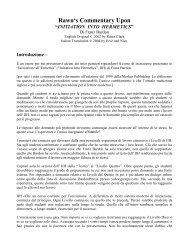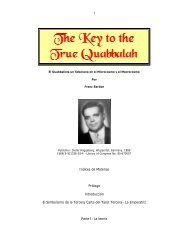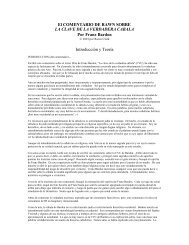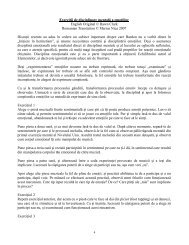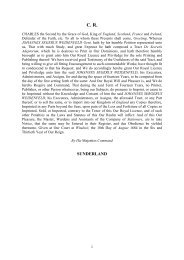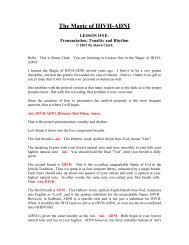Hermetic Philosophy and Alchemy - A Bardon Companion
Hermetic Philosophy and Alchemy - A Bardon Companion
Hermetic Philosophy and Alchemy - A Bardon Companion
You also want an ePaper? Increase the reach of your titles
YUMPU automatically turns print PDFs into web optimized ePapers that Google loves.
The sacred fire of saint <strong>and</strong> sage,<br />
Thro’ every clime in every age,<br />
In Boehme’s wondrous page we view,<br />
Discoverd <strong>and</strong> revealed anew", etc.<br />
Revealed anew, it will be observed, theosophically, but not intellectually. Nothing, since the Greeks,<br />
has been found to approach their doctrine of Wisdom in perspicuity, grace of utterance, <strong>and</strong> scientific<br />
explication of the divine source. Of all the successors on the same road, none have exceeded their<br />
authority, <strong>and</strong> very few have attained to the perfect veracity <strong>and</strong> ideality of their ground; but of this<br />
hereafter. Numerous works on <strong>Alchemy</strong> have issued from the German press, detailing the experience<br />
of excellent <strong>and</strong> learned adepts; amongst those of later years may be mentioned Ambrose <strong>and</strong> Phillip<br />
Mueller (78); Herman Fichtuld (79); <strong>and</strong> his friend George Von Welling (80); J. Crollius (81); the Van<br />
Helmonts, father <strong>and</strong> son (82); Grasseus, the reputed author of the Water Stone (83), a personal friend<br />
of Boehme’s; Henry Khunrath, a pious <strong>and</strong> learned adeptest (84); Andrew Libavius (85); J.J. Beccher<br />
(86); <strong>and</strong> J. Tollius, a Dutchman <strong>and</strong> an elegant classical expositor on the same ground (87). Faber<br />
also (88); but of all those who have connected ancient fable with philosophy, <strong>and</strong> explained them by<br />
the <strong>Hermetic</strong> key, Michael Maier ranks first; <strong>and</strong> his works are more esteemed <strong>and</strong> sought after even<br />
in the present day, than is easily accountable, since he is profoundly guarded in his revelations (89).<br />
Highly curious engravings <strong>and</strong> woodcuts adorn the works of these authors, <strong>and</strong> even the title pages of<br />
many of them convey more idea <strong>and</strong> food for reflection than other modern tomes, oftentimes<br />
throughout the whole of their development.<br />
The Novum Lumen Chemicum, which passes under the name of Michael Sendivogius, the Polish<br />
adept, is one of the best known <strong>and</strong> popular of modern works on the subject. It has been translated into<br />
English by John French, also a practitioner (90); whose introductory preface is bold <strong>and</strong> striking, <strong>and</strong><br />
was published in London under the title of The New Light of <strong>Alchemy</strong>, with the nine books of<br />
Paracelsus, De Natura Rerum, in 1650. This New Light, professedly drawn from the fountain of<br />
nature, <strong>and</strong> grounded in manual experience, is cleverly h<strong>and</strong>led, <strong>and</strong> of an attractive character; though<br />
in consequence of the willful disorder <strong>and</strong> perplexity of the composition, repeated perusal <strong>and</strong> a<br />
certain knowledge are requisite, in order to gather its recondite drift; <strong>and</strong> so much the more, as its<br />
theory <strong>and</strong> asserted facts are at variance with our common conceptions <strong>and</strong> experience of the<br />
possibility of nature. The French edition of this work, also, has been translated by Digby, <strong>and</strong> contains,<br />
besides the Treatise on Salt omitted in the above, other curious additions, with a concluding Dialogue,<br />
which is instructive (91).<br />
There is a multitude of little English books on alchemy afloat on the book-stalls; amongst them some<br />
original, well-written, <strong>and</strong> worthy of perusal; for although Britain has not been so fertile in adepts as<br />
France <strong>and</strong> Germany, yet her scarce ones have been great; the profundity <strong>and</strong> comparative c<strong>and</strong>or of<br />
their writings, being very generally acknowledged by their foreign compeers to which Dufresnoy,<br />
though himself a skeptic, in his Histoire Hermetique bears this characteristic witness: --- "D’ailleurs<br />
on ne scauroit disconvenir que les Anglois n’ecrivent sur la science hermetique avec beaucoup de<br />
lumiere et de profondeur. Ils y font paroitre leur jugement et leur esprit de relexion. Il seroit a<br />
souhaiter qu’ils portassent la meme attention et la meme maturite a tout ce qu’ils entreprennent, on<br />
seroit beaucoup plus content d’eux et ils ne s’exposerait pas a perdre l’estime des autres nations<br />
comme ils s’y risquent tous les jours" (92).<br />
This piece of flattering French testimony refers, we suppose, to the writings of our early adepts;<br />
otherwise, of all that have flourished in latter times, the most celebrated <strong>and</strong> facile princeps, is that<br />
Anonymous who styles himself Eirenaeus Philalethes: the many works that have appeared under this<br />
signature indicate so excellent <strong>and</strong> perfect an artist, that his brethren, always speaking with admiration,<br />
unanimously award him the garl<strong>and</strong>. Yet of himself, his name, <strong>and</strong> habits of life nothing is known; no<br />
cotemporary mentions him; Starkey, indeed, professes to have been his servant once for a time in<br />
America, <strong>and</strong> to have assisted him in the art; <strong>and</strong> describes him as an English gentleman of an ancient<br />
<strong>and</strong> honorable family then living on his own estate <strong>and</strong> rarely learned. --- "I saw", says he, "in my



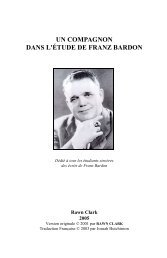
![Magie de YHVH-ADNY et Archeus[1]](https://img.yumpu.com/16926522/1/190x245/magie-de-yhvh-adny-et-archeus1.jpg?quality=85)
